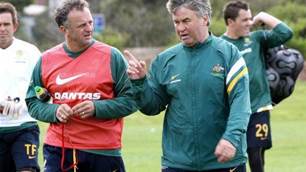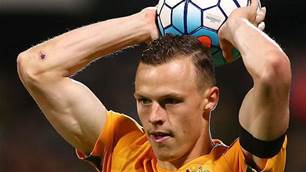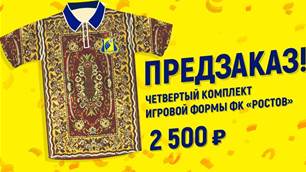"Like winning a game of Russian roulette" was how coach Guus Hiddink described the dramatic climax to Russia's Euro 2008 qualifying campaign.
Russia almost limped over the finishing line with a 1-0 win against part-timers Andorra.
Meanwhile, in London, Croatia were answering their prayers by beating England who had only needed a draw to clinch the second qualification berth alongside the Croats.
It may not have been by the easiest route but Russia and Hiddink made it to Switzerland and Austria in the end.
The 61-year-old Dutchman took over as Russia coach last summer and had impeccable credentials with great success in his two stints with PSV Eindhoven.
Furthermore, he had led Holland and South Korea to World Cup semi-finals and Australia into the last 16 in last year's World Cup.
Previously, the Russia job had been held by products of the Soviet system such as Oleg Romantsev, Anatoli Byshovets and Georgi Yartsev.
Hiddink's boldest move has been to put his faith in youngsters.
The average age of the team that faced Andorra was 25 with midfielder Konstantin Zyrianov the team's senior citizen at 30.
Fulham's Alexei Smertin, Zenit St Petersburg's Vladislav Radimov and Saturn Moscow Region duo Vadim Yevseev and Dmitri Loskov have been eased into retirement.
Youngsters like Kuban Krasnodar goalkeeper Vladimir Gabulov, Nurnberg midfielder Ivan Saenko and Udinese's Viktor Boudianski have been given their chance.
Hiddink is not getting ahead of himself, saying after the Andorra game: "We're on a difficult path and we're making our way down it step by step. Today one such step has been made.
"For Russia, qualifying for the European Championship finals is a very important landmark. Now it is up to the powers that be to take the decisive steps in developing the country's football infrastructure.
"Progress accelerates success and Russian football, without doubt, is making progress."
Hiddink still has his work cut out in convincing Russian fans so accustomed to failure and underachievement that the future is bright.
But Russia are still a team in transition, and the surprise qualification should be treated as a bonus.
Russia, like Hiddink himself says, are on a journey - but have they peaked too soon?
Next summer's finals also mark the 20th anniversary since the Russians' last significant contribution on the world stage, when the USSR team lost the Euro 88 final 2-0 to a Dutch side they had defeated in the earlier rounds.
Emulating that feat next summer in Austria and Switzerland is unlikely, but with Hiddink at the helm, anything is possible.
Meanwhile, in London, Croatia were answering their prayers by beating England who had only needed a draw to clinch the second qualification berth alongside the Croats.
It may not have been by the easiest route but Russia and Hiddink made it to Switzerland and Austria in the end.
The 61-year-old Dutchman took over as Russia coach last summer and had impeccable credentials with great success in his two stints with PSV Eindhoven.
Furthermore, he had led Holland and South Korea to World Cup semi-finals and Australia into the last 16 in last year's World Cup.
Previously, the Russia job had been held by products of the Soviet system such as Oleg Romantsev, Anatoli Byshovets and Georgi Yartsev.
Hiddink's boldest move has been to put his faith in youngsters.
The average age of the team that faced Andorra was 25 with midfielder Konstantin Zyrianov the team's senior citizen at 30.
Fulham's Alexei Smertin, Zenit St Petersburg's Vladislav Radimov and Saturn Moscow Region duo Vadim Yevseev and Dmitri Loskov have been eased into retirement.
Youngsters like Kuban Krasnodar goalkeeper Vladimir Gabulov, Nurnberg midfielder Ivan Saenko and Udinese's Viktor Boudianski have been given their chance.
Hiddink is not getting ahead of himself, saying after the Andorra game: "We're on a difficult path and we're making our way down it step by step. Today one such step has been made.
"For Russia, qualifying for the European Championship finals is a very important landmark. Now it is up to the powers that be to take the decisive steps in developing the country's football infrastructure.
"Progress accelerates success and Russian football, without doubt, is making progress."
Hiddink still has his work cut out in convincing Russian fans so accustomed to failure and underachievement that the future is bright.
But Russia are still a team in transition, and the surprise qualification should be treated as a bonus.
Russia, like Hiddink himself says, are on a journey - but have they peaked too soon?
Next summer's finals also mark the 20th anniversary since the Russians' last significant contribution on the world stage, when the USSR team lost the Euro 88 final 2-0 to a Dutch side they had defeated in the earlier rounds.
Emulating that feat next summer in Austria and Switzerland is unlikely, but with Hiddink at the helm, anything is possible.
Copyright (c) Press Association
Related Articles

Ex-Socceroo: ‘Hiddink still the master’

Smith lifts lid on World Cup snub













